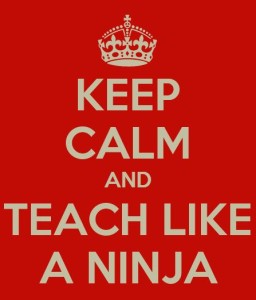When asked to document a day in the life of a teacher I am struck by a discord as to whether to mention the ever increasing amount of paper work in pursuit of ‘transparency’ which seems to drive all schools today, or whether to focus on the flip side, the inspiring and rewarding side (the actual kids). Thus I figured I’d write about my typical day and leave you to draw whatever conclusions you would like about which side of teaching features more prominently.
Depending on the teacher, you will find them arriving anywhere between 6:00-8:30, (those who get more planning done before school vs those who prefer planning after school). I tend to be of the after school persuasion so usually front up quite late, around 8am. The truth is, as a teacher, you’re going to want to be a ‘morning person.’ The minute you walk through the school gates, (laptop over one shoulder, lunch in backpack over the other, trolley of marking dragged in your right hand and a coffee gripped in the left), you will set personal challenges to see exactly how many steps into the school grounds you can take before you are ‘spotted.’ Now, the ‘spotting’ can vary from a chorus of “Good morning Miss,” and a myriad of excited “Miss, Miss, Miss, Miss, Miss, you’ll never guess what happened on the weekend…./I’ve brought in my assignment/I got my hair cut etc,” to which you will “ooo” and “aaah” appropriately. A few steps further, the old chesnut “Miiiiiiiiiiiss, he just my swore at me/punched me/stole my money” etc to which you will need to address this grievance (I’m not going to lie, mediating this could mean you’re here until the bell goes). However, assuming you can press on, the spotting will continue with a parent who will ask you for anything from requiring another note for an impending excursion, to a full run down on Little Johnny’s progress in literacy, to news of something plaguing the child at home (a fight with a friend, family trauma etc). Again, this will vary in length as to amount of time needed to address.
On reaching the staffroom you will engage in the usual morning banter with colleagues, get told about a change in timetable by your grade partner, informed of a new student by an executive and read the white board messages to find out who is sick, what extra playground duties you’ve been assigned or what paper work is required for this afternoon’s meeting. Then you will make your way to your pigeon hole to go through any new reports requested, mildly pissed off messages about overdue books from the librarian, inspiring quotes to brighten your day from the pastoral care teacher and new medical reports to read up about a child in your class.
Armed with the day’s latest information you then head up to your classroom to set up for your first session. Lo and behold the bell will have rung and your day begins. Morning assembly and messages from the principal will be followed by rolls in home rooms. Depending on what model your school has adopted, you will either launch straight into lessons or else spend the next 20 minutes on morning fitness and brushing teeth. In reading this morning, you’ll be continuing the unit on famous political speeches throughout history. Of course, the reason you are doing this topic is because it needs to be integrated with HSIE, in which you are studying Democracy and Government, which is also why you are doing political biographies in writing. Your whizbang unit on these inspiring speeches will be student centred (featuring group work), require the students to use all Gardner’s Multiple Intelligences, engage Bloom’s Taxonomy and de Bono’s Six Thinking Hats while using the 21st Century Framework. Did I mention paper work and transparency? From this you will take anecdotal records in order to sign and date exactly which outcomes Little Johnny achieved today.
Now, I myself teach the Special Needs class which means I also follow either an Individual Adjustment Plan or Individual Education Plan for each student. Did I mention paper work? This takes the form of a three page report on each child every six months and details modifications to everything from the classroom environment (never forget the brilliance of the third teacher), my pedagogy, streaming (that dirty, dirty word) and altering assessments to best cater to each child’s needs.
The bell goes and you are lucky because today you only have a recess duty! You will spend the next half hour having (what can be) a delightful time chatting with students while circumnavigating your designated area. Along the way you will put out spot fires and remind at least ten students of the ‘No hat, no play’ rule. Depending on the weather, the moon and the tides, this time can vary from lovely to horrific. In the case of horrific, you are invariably dealing with the windy day and full moon combo. In this case you will break up fights, which may require radioing the office for back up, send other children to the time out area, a further five to the first aid room and confiscate the sling shot which Andy got for his birthday and had the bright idea to bring in for Show and Tell.
In the second session you begin with numeracy, today long division (which of course includes a largely hands on element). This will be followed by HSIE, today the piece de resistance which you have spent all term working up to, democracy in action, the mock election!
The rest of the day; lunch (where you will get to go to the toilet, eat and actually sit down for the first time since you walked into the school grounds) then sport, follows without event (every child has been looking forward to sport and there were only two collisions today). You suddenly find the afternoon bell ringing and wonder where that time went and more specifically, ponder when you will fit in teaching all the unfinished work from today.
Now it is time to collect the required paper work and make your way to the aforementioned staff meeting. This week the priority will be a new-fangled way of programming, developed by an educational expert in America, ‘UBDs’. This has you baffled, as last week’s priority, ‘The 7E’s’, was also a new way of programming, from an educational expert in Holland and the week before’s priority, ‘The 6Ds’ was from an expert in England. (NB. if you don’t like acronyms, get out of the profession now, they’re rife in education). There comes a week however, where there are so many priorities that they will cease to be priorities and just become a list.
The day is over. You quickly do some marking before heading home to do some programming. Did I mention paper work?
Lying in bed that night you are still thinking about what went well and what went wrong (there is not an ‘off’ switch). I have totally left out a huge facet of every teacher’s day; behaviour management. If I even attempted to address that in this blog, it would require a further ten pages. I’m going to be honest, how much behaviour management impinges on a teacher’s day varies from school to school, teacher to teacher and even lesson to lesson. There is no sole right way to deal with misbehaviour, however it is very easy for the best laid plans and most organised lesson to go awry if a single, but particular child is ‘off’.
Your accurate observation is that I have spent far more time highlighting the paper work aspect of my job than the rewarding parts of my job, however, I want you to go into this profession with open eyes. The paper work is there and it’s there to stay. From my perspective it’s the toughest part of the job. The combination of paper work and student misbehaviour are accountable for the very high carnage rate of new teachers. I cannot find current reliable data, however I have heard quoted numerous times the statistic of 4 out of 5 new grad teachers burning out within their first five years. This is quite possibly completely inaccurate; however it does reflect the highly emotional and high pressure nature of the job. However, (and this is where I will gush), it IS all worth it and it’s worth it in spades! If you think you’ve got a will of iron and the necessary grit, along with organisation, patience (HEAPS of it), empathy, fun, creativity and let’s not forget the sense of humour, then it’s the emotional roller coaster of a lifetime and one very worth getting on.


